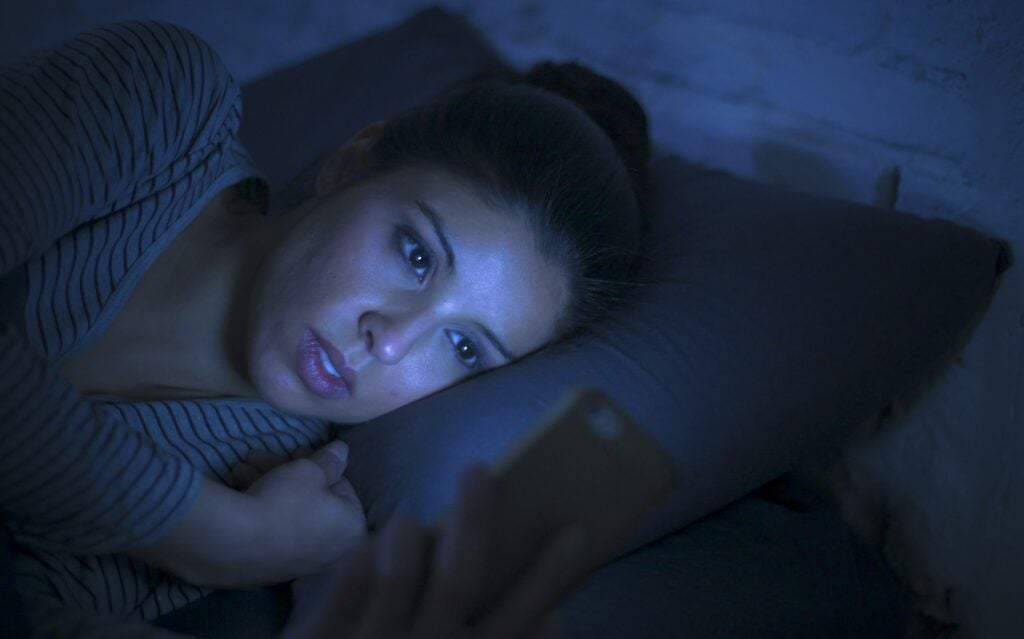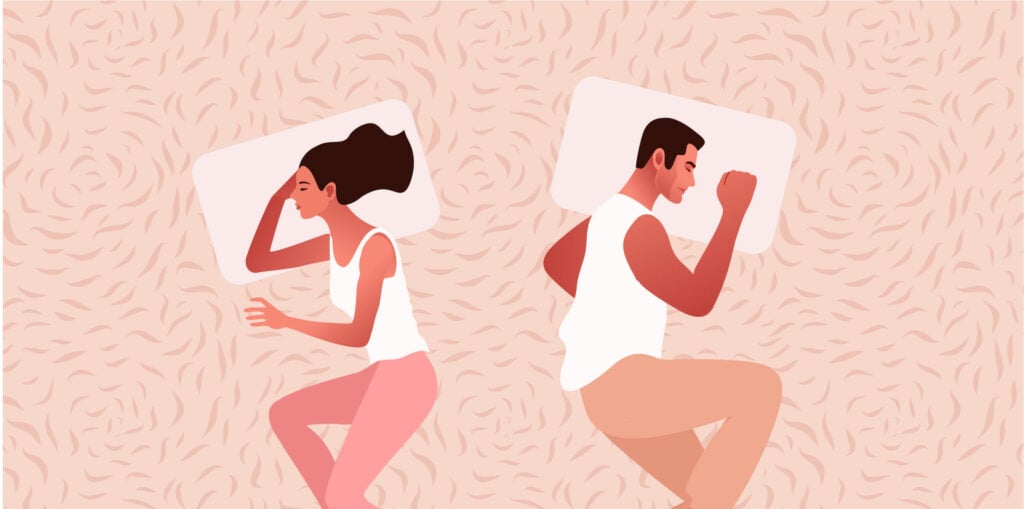Sleep and mental health
Reviewed by Stephanie Steinman, PhD, CSAC

How Sleep Affects Mental Health
Getting enough sleep is critical for one’s health both physically and mentally. However, according to the Sleep Foundation, over 35% of adults in America get less sleep than what is recommended (at least seven hours), and 10-30% of adults struggle with chronic insomnia.


A lack of sleep from insomnia or other sleep disorders can worsen stress, anxiety, depression, and other mental health concerns. These mental health concerns can also result in poor sleep, making the relationship between sleep and mental health closely intertwined.
Common Sleep Disorders Affecting Mental Health
A sleep disorder could be the root cause of sleep deprivation and resulting mental health concerns. Common sleep disorders that can affect mental health include:
- Circadian rhythm disorder: This involves difficulty falling asleep, staying asleep, and/or waking up due to a disruption in sleeping patterns. Circadian rhythm disorder can be caused by problems with the body’s internal clock or from the internal body clock not matching the external environment.
- Sleep paralysis: A person with sleep paralysis is unable to move while they are sleeping, right after they wake up, or both. The episodes usually only last a few minutes but can be extremely frightening, creating anxiety and fear about sleeping.
- Nightmares/night terrors: Nightmares are unpleasant dreams, while night terrors refer to a fearful reaction when transitioning from one sleep stage to the next. Both recurrent nightmares and night terrors can cause anxiety that affects the quality of someone’s sleep.
- Nocturnal panic attacks: Nocturnal panic attacks happen during sleep with no obvious trigger and cause someone to wake up with unpleasant symptoms like rapid heart rate, trembling, shortness of breath, and a sense of doom.
What Is Sleep Deprivation?
Sleep deprivation occurs when someone gets less sleep or lower quality sleep than what is needed. The average adult needs between seven and ten hours of sleep each night.
Acute sleep deprivation can occur when someone goes a few days with significantly less sleep than what is needed, while chronic sleep deprivation occurs when someone goes several months without proper sleep. Chronic sleep deprivation can eventually lead to symptoms of psychosis.
Signs of sleep deprivation include:
- Difficulty concentrating
- Slowed thinking
- Daytime fatigue
- Memory problems
- Poor decision-making
- Lack of energy
- Irritability
Who Is at Risk of Sleep Deprivation?
Certain groups may be at a greater risk for sleep deprivation and the mental health concerns that occur with it.
Factors that may increase a person’s risk for sleep deprivation include:
- Aging: Our quality of sleep often decreases as we age. People over the age of 65 are at a higher risk for insomnia and other sleep issues.
- Medications: Certain medications may interfere with sleep, making it difficult to fall asleep or stay asleep.
- Illness: Illnesses such as cancer can make falling asleep and staying asleep more difficult. Those who have an illness may also be more at risk for negative consequences of sleep deprivation, as a lack of sleep can greatly affect the body’s immune response.
- Schizophrenia: Schizophrenia is a mental health disorder that can involve hallucinations, delusions, and paranoia. Those who have schizophrenia are also at a greater risk for sleep deprivation and worsened mental health symptoms as a result.
- Attention-deficit/hyperactivity disorder (ADHD): ADHD is associated with sleep problems, such as difficulty falling asleep, staying asleep, and difficulty waking. Sleep deprivation can worsen and contribute to symptoms of ADHD as well.
How Mental Health Affects Sleep Quality
Stress
Occasional stress is a normal part of life. However, chronic stress can have some negative physical and mental effects.
One of the many possible consequences of chronic stress is sleep deprivation. Someone who is stressed is typically more alert and may be kept awake with racing thoughts. This can make it difficult to fall asleep and stay asleep.
Anxiety
People who have anxiety may be more at risk for sleep disturbances. Those who have anxiety may have a difficult time turning off negative thoughts and worries to get to sleep and stay asleep. This can lead to sleep deprivation which in turn, makes anxiety more difficult to manage, causing a vicious cycle.
Some people have anxiety about not being able to sleep, known as sleep anxiety. Sleep anxiety involves fear and stress about going to sleep and often occurs at the same time as other sleep problems like insomnia.
Depression
Depression and sleep problems are closely connected, often making it difficult to determine which came first. Those who have sleep disorders like insomnia are at a greater risk for developing mental health concerns like depression. People with depression may suffer from insomnia and fatigue, or they may struggle with oversleeping, also known as hypersomnia.
Bipolar Disorder
Bipolar disorder involves intense mood changes with episodes of mania (highs) and depression (lows). Both mania and depression can affect sleep in different ways. During an episode of depression, someone may struggle to maintain a regular sleep schedule, with difficulty falling asleep or waking up. During mania, someone may feel like they don’t need to sleep and stay up for several days on end.
Sleep problems may also be a trigger for episodes of depression or mania in someone who has bipolar disorder. Treating sleep deprivation and insomnia may help to manage symptoms.
How Lifestyle Changes Affect Sleep
A person’s lifestyle can greatly affect their quality of sleep, both positively and negatively. Those who are suffering from sleep deprivation might look at certain lifestyle factors to determine what is causing a lack of sleep and what can be changed to improve sleep.
Life Changes
Certain life changes can lead to sleep deprivation. These changes may cause temporary sleep deprivation, or result in chronic sleep problems.
Life changes that contribute to sleep deprivation include:
- Having a child
- Getting older
- Oversleeping often
- Hormonal changes caused by menopause or perimenopause
- Jet lag from traveling across time zones
Health Conditions
Physical health conditions can affect the quality of sleep. Certain health conditions and physical changes that may cause sleep problems include:
- Narcolepsy
- Sleep apnea
- Pregnancy
- Restless leg syndrome
- Diabetes
- Respiratory problems
Physical Activity
Physical activity can help to reduce stress, anxiety, depression, and other mental health concerns, which can in turn help with sleep. Certain forms of exercise, such as running, can also boost levels of serotonin, the naturally occurring chemical that helps regulate the body’s sleep-wake cycle.
By incorporating more physical activity and exercise into your routine (usually recommended at least 90 minutes before bedtime), you might begin falling asleep and staying asleep more easily.
Sleep Hygiene
Sleep hygiene refers to a person’s bedroom environment as well as their daily routine leading up to bedtime. Good sleep hygiene includes a sleeping environment that is comfortable with the right pillow and mattress, a cool temperature, and void of light and disruptive noise.
Some habits that promote good sleep hygiene include:
- Getting enough sun exposure each day
- Getting enough physical activity
- Avoiding nicotine and other stimulants
- Reducing or eliminating alcohol consumption
- Avoiding caffeine in the evening
- Avoiding eating too late
- Using the bed only for sleep or sex
By making some minor changes to your bedroom environment and daily habits, you can begin to establish better sleep hygiene for improved sleep.
Treatments & Getting Help
Sometimes, professional help is needed to improve sleep and potential mental health conditions that may be contributing to sleep deprivation.
A therapist may help treat sleep deprivation using:
- Medication: Medication such as antidepressants and anti-anxiety medication can help manage mental health concerns that may be contributing to sleep problems.
- Cognitive behavioral therapy (CBT): CBT can help someone reshape their negative thoughts about sleep and other worries that may be keeping them awake at night and recommend helpful behavioral strategies. There is even a specific type of CBT for insomnia (CBT-I).
- Mindfulness: Relaxation therapies such as mindfulness and meditation can help reduce stress and lead to higher-quality sleep.
- Light box therapy: Light box therapy is a treatment where a person is exposed to a specific wavelength of light. It can be recommended by therapists to treat insomnia and other sleep disorders.
Getting enough sleep is essential for your physical and mental wellbeing. If you struggle with sleep problems such as insomnia and sleep deprivation, help is available. A therapist can help determine the root cause of your sleep problems so you can start resting more fully.
Find a sleep therapist near you today.

About the author
The editorial team at therapist.com works with the world’s leading clinical experts to bring you accessible, insightful information about mental health topics and trends.
Related articles

Insomnia: Causes, symptoms, effects, and treatments
Can’t sleep? Insomnia is a sleep disorder characterized by difficulty falling...

To stay together forever, get a sleep divorce
One in five couples sleep in separate rooms. So why do we still feel so weird...

Most adults need at least seven hours of sleep, and getting too little can harm...

Revenge bedtime procrastination: Why we do it and how to stop
Revenge bedtime procrastination involves putting off going to bed in order to...
